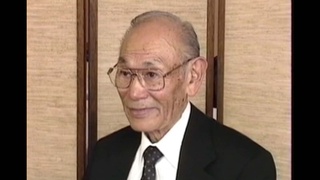Interviews
Fellow Hapa 442 Hana
Hana, I should say, but I always call him Hana. And he had freckles and kind of reddish hair and he was shorter than I was…but that’s alright. He and I ran around together a lot and when he was killed, all the 442nd guys—about 5 or 6 of them—knew that he was my friend and I remember them putting him on the back of a…a weapon’s carrier and drove it up to where I was and said, “Would you like to look at Hana?” and I said…well I said, “Well where is he?” They said, “He’s over in the weapon’s carrier over there.” And they said he was killed. And that was quite devastating. So I walked over and they said, Do you want us to unzip the mattress carrier?” (that’s what they put you in when you…) and I said, “No, no…” I said no…and it was a sad day but that’s…that’s where war is I guess.
Date: February 12, 2013
Location: California, US
Interviewer: Duncan Williams
Contributed by: Watase Media Arts Center, Japanese American National Museum with support of NITTO Tires Life History Project. Courtesy of the USC Hapa Japan Database Project.







